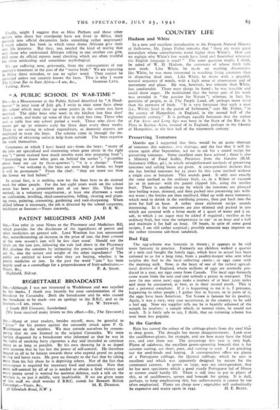COUNTRY LIFE
Hudson and White
In a new and excellent introduction to the Penguin Natural History of Selbourne, Mr. James Fisher remarks that "there are many great naturalists whose contributions stand higher than White's. How can we explain why White's few words have lived and flourished wherever the English language is used?" The same question might, I think, be asked of W. H. Hudson, the centenary of whose birth falls next week. Like White, he ni,tcle no startling discoveries; like White, he was more interested in watching living creatures than in dissecting dead ones. Like White, he wrote with a graceful, natural sequence of words, with a high sense of observation and of movement and place. He was, however, less tolerant than White, less comfortable There were things he hated ; he was irascible and could show anger. He maintained that the better part of his work was revealed in "the passion for Nature "; whereas, in fact, his portraits of people, as in The Purple Land, afe perhaps more vivid than his portraits of birds. "It is very fortunate that such a man (i.e., White) lived in the parish of Selbourne," says Mr. Fisher, "in the county of Hampshire, in England, in the second half of the eighteenth century." It is perhaps equally fortunate that the author of Far Away and Long Ago was born in the State of the Rio de la Plata in Buenos Aires, instead of in England, perhaps in the County of Hampshire, in the first half of the nineteenth century.


























 Previous page
Previous page